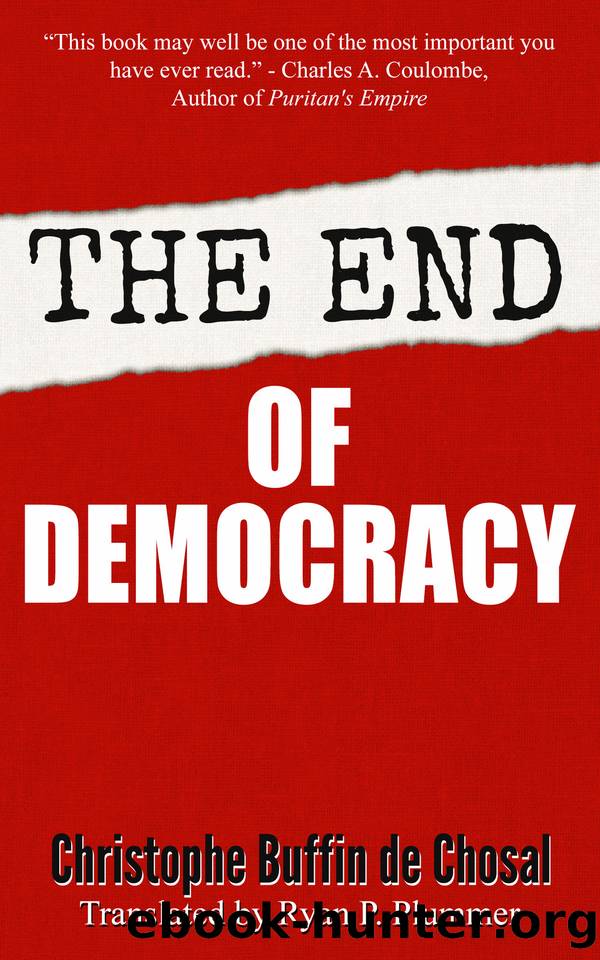The End of Democracy by Buffin de Chosal Christophe & Buffin de Chosal Christophe

Author:Buffin de Chosal, Christophe & Buffin de Chosal, Christophe [Buffin de Chosal, Christophe]
Language: eng
Format: epub
Publisher: Tumblar House
Published: 2017-10-01T16:00:00+00:00
Chapter 5
The European Union
The totalitarian orientation of democracy is easily observed in every democratic nation-state. Everywhere it is the same unbridled growth in the prerogatives of the state, in its power to regulate, to intervene, and to discriminate. Everywhere there is also the same unaccountability and the same corruption among the ruling oligarchy. The European Union is not exempt from this same orientation. It is an excellent example of a transnational superstructure meant to serve foreign interests at the expense of the populations it administers. But of course democratic forms are preserved in order to maintain the populations in delusion. In practice, the European Union reproduces the same defects found in national governments, but what gives it more of an exemplary character is that it reproduces these defects exponentially. The distance it puts between itself and the European populations makes its totalitarian dysfunction more flagrant and its effects more visible. Its examination is therefore most useful for showing the true nature of a democratic system.
What should sound the alarm is that the European Union is always seeking to justify its own existence. Being a superstructure rather than a nation-state, it feels the need to explain why it is so indispensable. A nation-state does not feel this need to justify itself, for it has a basis in the people and there is a general consensus favoring its existence which it can afford to take for granted. But the European Union cannot claim these advantages. Thus, it must find other grounds on which to establish its legitimacy.
The European Union made the Franco-German reconciliation its dominant theme. It has used this moral justification to make appear as normal the concentration of power from which it benefits at the expense of member states’ sovereignty. This reconciliation also justifies the seat of the European Parliament in Strasbourg, which is a considerable source of useless spending. The argument of peace stemming from the Franco-German reconciliation is also rehashed at every opportunity. The European Union has supposedly brought sixty years of peace to Europe. This self-awarded commendation is all the more remarkable considering Western Europe has not experienced any threat of an internal war throughout this period and, consequently, no war was able to be avoided on account of the European Union. Furthermore, even if such a threat had existed, one can hardly imagine how the European Union would have been able to do anything to resolve it. It is, after all, militarily impotent and diplomatically divided—qualities that appear to be present in one form or another in every conflict that erupts in the world. The idea that NATO was responsible for securing peace in Western Europe is a completely defendable notion, but to argue the same for the European Union is utterly ridiculous.
The European Union seeks a justification to give to its citizens. If it is not peace, then it would allegedly be the euro. The majority of Europeans consider the single currency to be what makes them undoubtedly the most grateful for the European Union.
Download
This site does not store any files on its server. We only index and link to content provided by other sites. Please contact the content providers to delete copyright contents if any and email us, we'll remove relevant links or contents immediately.
| Elections & Political Process | Ideologies & Doctrines |
| International & World Politics | Political Science |
| Public Affairs & Policy | Specific Topics |
| United States |
The Secret History by Donna Tartt(16623)
The Social Justice Warrior Handbook by Lisa De Pasquale(11489)
Thirteen Reasons Why by Jay Asher(7788)
This Is How You Lose Her by Junot Diaz(5772)
Weapons of Math Destruction by Cathy O'Neil(5037)
Zero to One by Peter Thiel(4824)
The Myth of the Strong Leader by Archie Brown(4789)
Promise Me, Dad by Joe Biden(4447)
Beartown by Fredrik Backman(4418)
Stone's Rules by Roger Stone(4415)
How Democracies Die by Steven Levitsky & Daniel Ziblatt(4398)
The Fire Next Time by James Baldwin(4342)
100 Deadly Skills by Clint Emerson(4077)
A Higher Loyalty: Truth, Lies, and Leadership by James Comey(4032)
Rise and Kill First by Ronen Bergman(4012)
The David Icke Guide to the Global Conspiracy (and how to end it) by David Icke(3881)
The Farm by Tom Rob Smith(3872)
Secrecy World by Jake Bernstein(3782)
The Doomsday Machine by Daniel Ellsberg(3731)
